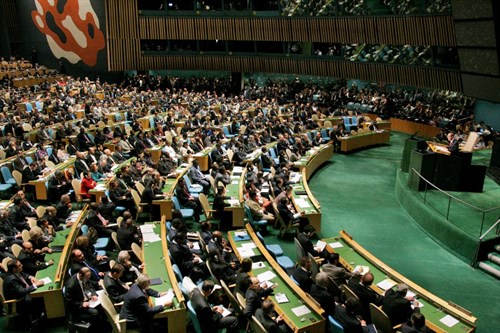Add your voice to UNGASS 2016
The CND is requesting civil society participation and comments for the UN General Assembly on Drugs to be held in 2016. Civil society and non-governmental organisations include the “affected populations” of physicians, nurses, medical associations, national and regional hospice and palliative care organisations, and patients’ groups, among others.
16 Dec 2014By Katherine Pettus
The United Nations Commission on Narcotic Drugs (CND) needs your help. This is your chance to speak out so please read on and find out what you can do to make sure that all those who need it have access to essential medicines and palliative care services.
United-Nations-General-AssemblyCND is requesting civil society participation and comments for the UN General Assembly on Drugs to be held in 2016. This special assembly is called United Nations General Assembly Special Session (UNGASS). Civil society and non-governmental organisations (for our purposes) include the “affected populations” of physicians, nurses, medical associations, national and regional hospice and palliative care organisations, and patients’ groups, among others.
Who are the affected populations?
In the case of UNGASS, they are communities made particularly vulnerable by drug policies. Regarding essential controlled medicines such as morphine, hydromorphone and oxycodone, affected populations are the millions of patients and their families around the world who must bear excruciating pain in countries where the medicines are not available. Drug policy laws enacted to prevent diversion and abuse have resulted in the unwanted consequence of restricting access to this vulnerable population in more than 83% of the world, according to the World Health Organization and the International Narcotics Control Board.
It’s ‘business as usual’ unless you comment
The substantive and procedural stakes of the debate in Vienna at the CND are the extent to which vulnerable populations and UN agencies are invited to participate meaningfully in the UNGASS process. If they are not, business will continue as usual, favouring control rather than provision of opioid medicines, and member states will be unable to benefit from the informative, ground up presence of civil society. As of now, CND says it welcomes civil society input and the United Nations Office on Drugs and Crime (UNODC); the executive branch of CND, has created a web link for that purpose. It is crucial that civil society organisations having direct knowledge of barriers to access to essential pain medicines send a message through the civil society link on the UNGASS website.
This call clearly includes the organisations that participated in the ATOME (Access to Opioid Medicines in Europe) project, organisations in Latin America that participated in the opioid availability workshops led by the International Association for Hospice and Palliative Care, and organisations represented in the International Pain and Policy Fellowship program at the WHO Collaborating Center at the University of Madison in Wisconsin, USA. Contributions will be entered into the record and can be used for advocacy and evidence. According to the website, “all relevant UN entities, international and regional organizations as well as all NGOs which regularly attend the Commission have been invited to contribute.”
Doctors can lead the way to healthier drug policies – join IDHDP now.
Share this on: